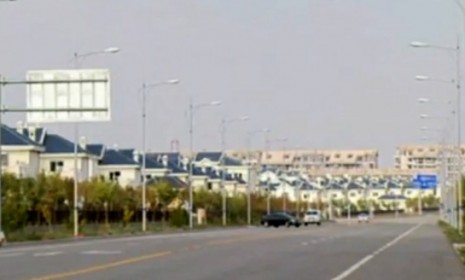The ghost city of China
The Chinese government has spent millions developing "the Chinese version of Dubai" outside the existing city of Ordos. One problem — nobody lives there

A free daily email with the biggest news stories of the day – and the best features from TheWeek.com
You are now subscribed
Your newsletter sign-up was successful
A new city in inner Mongolia was supposed to be a "Chinese version of Dubai," reports The New York Times, and accommodate 300,000 people. But almost five years after the government began intensive construction, only 28,000 citizens (if that) have moved to Kangbashi New Area, 15 miles from the metropolis of Ordos — the buildings are empty, the boulevards are free of cars, and "weeds are beginning to sprout up in luxury villa developments that are devoid of residents." Yet building continues at China's usual frenetic pace. How did this happen and what does it mean for the future of China? (Watch an al Jazeera report about the empty town)
What's the backstory?
China's economy has been growing at a spectacular rate in recent years, and construction has been the main engine of that growth. "The Ordos county government built Kangbashi because frankly, it is rich enough to afford it," says Teoh Kok Lin at The Malaysia Star. The county (population 1.6 million people) is "home to one of China’s major coal mining and natural gas producers," so there's no shortage of wealth in the area.
The Week
Escape your echo chamber. Get the facts behind the news, plus analysis from multiple perspectives.

Sign up for The Week's Free Newsletters
From our morning news briefing to a weekly Good News Newsletter, get the best of The Week delivered directly to your inbox.
From our morning news briefing to a weekly Good News Newsletter, get the best of The Week delivered directly to your inbox.
Why are the Chinese still building?
Because they remain confident that the real-estate boom will continue long enough to populate Kangbashi. Despite appearances, the Times notes that housing sales in the city of Ordos proper reached $2.4 billion in 2009, up dramatically from $100 million in 2004. A local official sums up the unapologetic government stance: "This is a city of the future. We are going to build this into a center of politics, culture and technology. That is our dream." (A video promoting Kangbashi would seem to confirm that the government is pitching it as a reflection of Chinese ideals.)
Is this a sign that China's bubble is bursting?
Critics, including the state-run newspaper, argue that the empty town is proof that China's impossibly hot real-estate market can't possibly last. Investor Vitaliy Katsenelson, speaking to Forbes, calls such speculative development "the equivalent of building bridges to nowhere, but on a very large – Chinese – scale," and believes that at some point, "the piper will have to be paid." And the global consequences of a Chinese collapse could be dire, says Bill Powell at Time: "Since a huge real estate bust in the U.S. in 2008 was the catalyst for the still lingering global recession, many analysts fear a replay in China could prove disastrous."
A free daily email with the biggest news stories of the day – and the best features from TheWeek.com
Sources: The New York Times, Forbes, Time, Malaysia Star
-
 Film reviews: ‘Send Help’ and ‘Private Life’
Film reviews: ‘Send Help’ and ‘Private Life’Feature An office doormat is stranded alone with her awful boss and a frazzled therapist turns amateur murder investigator
-
 Movies to watch in February
Movies to watch in Februarythe week recommends Time travelers, multiverse hoppers and an Iraqi parable highlight this month’s offerings during the depths of winter
-
 ICE’s facial scanning is the tip of the surveillance iceberg
ICE’s facial scanning is the tip of the surveillance icebergIN THE SPOTLIGHT Federal troops are increasingly turning to high-tech tracking tools that push the boundaries of personal privacy
-
 The billionaires’ wealth tax: a catastrophe for California?
The billionaires’ wealth tax: a catastrophe for California?Talking Point Peter Thiel and Larry Page preparing to change state residency
-
 Bari Weiss’ ‘60 Minutes’ scandal is about more than one report
Bari Weiss’ ‘60 Minutes’ scandal is about more than one reportIN THE SPOTLIGHT By blocking an approved segment on a controversial prison holding US deportees in El Salvador, the editor-in-chief of CBS News has become the main story
-
 Has Zohran Mamdani shown the Democrats how to win again?
Has Zohran Mamdani shown the Democrats how to win again?Today’s Big Question New York City mayoral election touted as victory for left-wing populists but moderate centrist wins elsewhere present more complex path for Democratic Party
-
 Millions turn out for anti-Trump ‘No Kings’ rallies
Millions turn out for anti-Trump ‘No Kings’ ralliesSpeed Read An estimated 7 million people participated, 2 million more than at the first ‘No Kings’ protest in June
-
 Ghislaine Maxwell: angling for a Trump pardon
Ghislaine Maxwell: angling for a Trump pardonTalking Point Convicted sex trafficker's testimony could shed new light on president's links to Jeffrey Epstein
-
 The last words and final moments of 40 presidents
The last words and final moments of 40 presidentsThe Explainer Some are eloquent quotes worthy of the holders of the highest office in the nation, and others... aren't
-
 The JFK files: the truth at last?
The JFK files: the truth at last?In The Spotlight More than 64,000 previously classified documents relating the 1963 assassination of John F. Kennedy have been released by the Trump administration
-
 'Seriously, not literally': how should the world take Donald Trump?
'Seriously, not literally': how should the world take Donald Trump?Today's big question White House rhetoric and reality look likely to become increasingly blurred